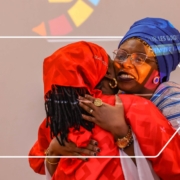Celebrating Human Rights Day around the world
Human Rights Office of the UN reported the activities around the world in day of Human Rights.
here is the report:
From Haiti to the Democratic Republic of the Congo to Geneva to Sri Lanka, UN Human Rights and partners organized a slew of activities around the world to mark Human Rights Day 2024 with a message that is enshrined throughout the Universal Declaration of Human Rights: human rights are about you and your life, and concern everyone, everywhere.
The theme of this year’s commemoration was “Our rights, our future, right now,” and focused on how human rights are a pathway to solutions that can empower individuals and communities to build a better future, particularly in times of crises.
With the participation of civil society, youth, human rights defenders and government institutions, the activities included film screenings, workshops, panel discussions, music and dancing performances, tree-planting ceremonies, moot courts with students, social media e-campaigns, old fashioned radio spot messages and even footraces in Ethiopia and Zimbabwe.
“In times of crisis, human rights offer solutions to complex problems,” said Nelson Muffuh, UN Resident Coordinator in South Africa, where the Regional Office for Southern Africa partnered with South Africa’s public broadcaster to produce a panel discussion on youth and combatting gender-based violence.
“In times of peace, human rights help us build equitable and prosperous societies. In times of uncertainty, human rights provide a lever for stability.”
In Haiti, where armed gang violence and widespread insecurity are deepening a dire humanitarian crisis, the Office organized support activities and awareness-raising sessions on human rights for orphaned children who are victims of gang violence. The day also offered a space to pay tribute to the children’s parents.
Human Rights Day events were held in Haiti, Zimbabwe, Sri Lanka, Geneva, DRC, Papua New Guinea, Indonesia and across the Arab world. © OHCHR
Human Rights Day events were held in Haiti, Zimbabwe, Sri Lanka, Geneva, DRC, Papua New Guinea, Indonesia and across the Arab world. © OHCHR
In Doha, with submissions from youths from all over the Arab world and Pakistan, the UN Human Rights Training and Documentation Centre produced a montage of short films about human rights as part of a film competition titled “Human Rights through the Lens of Youth.”
Human Rights Day in Kinshasha saw the award ceremony of the first edition of the national competition for the Julienne Lusenge Prize for Human Rights. A 2023 UN Human Rights Prize winner, Lusenge is a community leader and human rights defender who has fought for women’s and girl’s rights and against sexual violence in the Democratic Republic of the Congo for over 40 years.
In partnership with the United Nations Information Centres (UNICs), the Office a held film screening in Jakarta, where students discussed inclusion and equality for persons with disabilities, Indonesia’s marginalized indigenous communities, and public policies for the right to a healthy environment. With the support of field presences and UNICs, 18 public screenings and debates took place in 14 countries on a variety of human rights topics, including one in New York hosted by Ilze Brands Kehris, Assistant Secretary General for Human Rights.
“Fighting for public policy on the environment is about shaping a future where justice and sustainability coexist,” said one student in Jakarta.
Our rights, our future, right now
In Papua New Guinea, the Office moderated a livestreamed seminar on the State’s obligations to respect and protect human rights for all, which was organized by the department of Justice and the Attorney General’s office. In his keynote address, UN Resident Coordinator Richard Howard stressed the importance of invoking human rights protections in Papual New Guinea’s constitution and making them accessible down to the community level.
Several activities took place across Latin America and the Caribbean, including the screening of “State of Silence” in Mexico, followed by a panel discussion with journalists and human rights defenders on the safety of journalists, a high-level dialogue between the government and civil society organizations on the future of their rights in Cali, Colombia, as well as a rap concert with young people; and in Bahamas, a garden celebration at the National Art Gallery with the participation of high-level government officials.
In Yaoundé, the OHCHR Regional Office for Central Africa hosted a consultation with the Human Rights Commission of the Cameroon Bar Association on strengthening the protection of human rights defenders and groups in Cameroon, while in East Sudan the Office organized training workshops for persons with disabilities on monitoring and reporting of human rights violations, focusing on gender-based violence.
Workshops, panel discussions, moot courts, dances and exhibits on human rights mechanisms, justice and peacebuilding, freedom from torture, the right to education, and access to justice were also held in Burkina Faso, Chad, Guinea, Guinea-Bissau, Kenya, Kosovo, Liberia, Niger, Tanzania and Zambia, among other places.
In Geneva, the din of 500 secondary school students echoed through the ornate hallways of the Palais Wilson for an open day event that included a treasure hunt, a photo booth, games to learn about access human rights, and a discussion on human rights with Deputy High Commissioner Nada Al-Nashif and other human rights experts.
Al-Nashif told the young students that their voice, their questions, their solutions were more important than ever in today’s world to defend human rights.
“Today is a day to stop and think about what human rights mean. Equality for everyone. Protecting human dignity. The right to go to school, to get medical care, to express your opinion. All of these are your human rights,” she said.
In his video message to mark Human Rights Day 2024, UN Human Rights Chief Volker Türk captured the spirit of the day.
“Human rights are about people. They are about you and your life: your needs and wants and fears; your hopes for the present and the future.”
From South Africa to Kosovo to New York, Human Rights Day 2024 was marked by a common message: human rights are about you and your life and concern everyone, everywhere.

